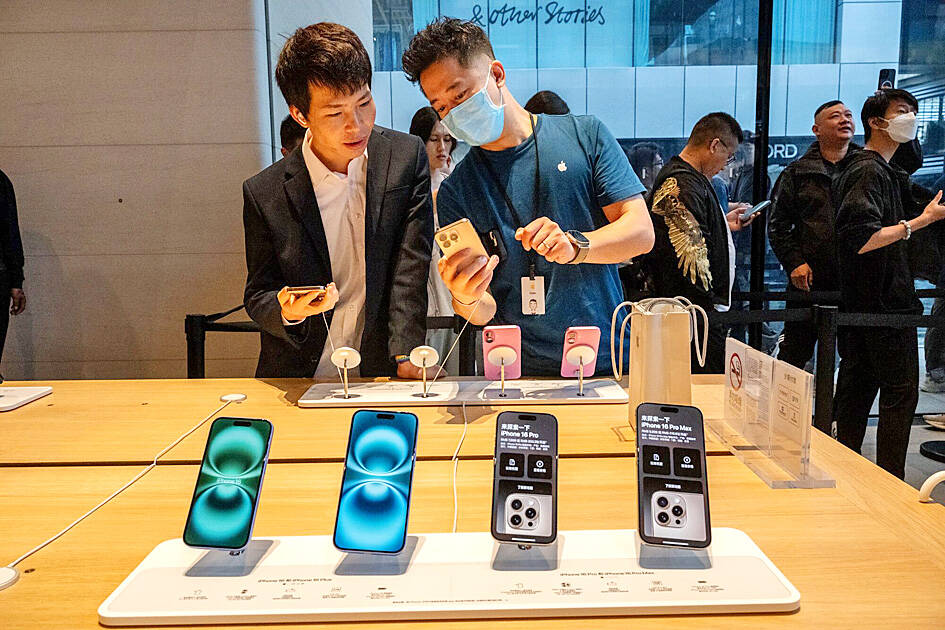Apple Inc sold 5 percent fewer iPhones and lost ground to Chinese rivals in the final quarter of last year, reflecting the absence of Apple Intelligence in its largest market outside the US.
The iPhone slipped a point to 18 percent market share last year, Counterpoint Research data showed.
Archrival Samsung Electronics Co also gave up share to faster-growing Android device makers from China, led by Xiaomi Corp (小米) and Vivo Communication Technology Co (維沃).

Photo: Bloomberg
Apple marked a 2 percent sales decline for the full year, the data showed, at a time that the wider market grew 4 percent globally.
California-based Apple has been playing catchup on artificial intelligence (AI), with its suite of AI enhancements rolling out in stages following the launch of the iPhone 16 in September last year.
Those AI additions are not yet available in any form in China, as the company is still working to secure local partners that can help provide features such as AI writing assistance and image generation.
Analysts last quarter also began warning that some investors harbored overly optimistic expectations of AI features.
“Apple’s iPhone 16 series was met with a mixed response, partly due to a lack of availability of Apple Intelligence at launch,” Counterpoint director Tarun Pathak said. “However, Apple continued to grow strongly in its non-core markets like Latin America.”
While it sold fewer units in China, Apple saw an increased proportion coming from its pricier Pro and Pro Max models, which accounted for more than half of all sales in the country.
Lenovo Group Ltd’s (聯想) Motorola and Shenzhen-based Huawei Technologies Co (華為) and Honor Device Co (榮耀) were the fastest-growing brands in the top 10, the researchers found.
China’s smartphone makers are all developing their own in-house AI tools and agents, including services that can perform tasks on a user’s behalf.

Application-specific integrated circuit designer Faraday Technology Corp (智原) yesterday said that although revenue this quarter would decline 30 percent from last quarter, it retained its full-year forecast of revenue growth of 100 percent. The company attributed the quarterly drop to a slowdown in customers’ production of chips using Faraday’s advanced packaging technology. The company is still confident about its revenue growth this year, given its strong “design-win” — or the projects it won to help customers design their chips, Faraday president Steve Wang (王國雍) told an online earnings conference. “The design-win this year is better than we expected. We believe we will win

Intel Corp chief executive officer Lip-Bu Tan (陳立武) is expected to meet with Taiwanese suppliers next month in conjunction with the opening of the Computex Taipei trade show, supply chain sources said on Monday. The visit, the first for Tan to Taiwan since assuming his new post last month, would be aimed at enhancing Intel’s ties with suppliers in Taiwan as he attempts to help turn around the struggling US chipmaker, the sources said. Tan is to hold a banquet to celebrate Intel’s 40-year presence in Taiwan before Computex opens on May 20 and invite dozens of Taiwanese suppliers to exchange views

Chizuko Kimura has become the first female sushi chef in the world to win a Michelin star, fulfilling a promise she made to her dying husband to continue his legacy. The 54-year-old Japanese chef regained the Michelin star her late husband, Shunei Kimura, won three years ago for their Sushi Shunei restaurant in Paris. For Shunei Kimura, the star was a dream come true. However, the joy was short-lived. He died from cancer just three months later in June 2022. He was 65. The following year, the restaurant in the heart of Montmartre lost its star rating. Chizuko Kimura insisted that the new star is still down

While China’s leaders use their economic and political might to fight US President Donald Trump’s trade war “to the end,” its army of social media soldiers are embarking on a more humorous campaign online. Trump’s tariff blitz has seen Washington and Beijing impose eye-watering duties on imports from the other, fanning a standoff between the economic superpowers that has sparked global recession fears and sent markets into a tailspin. Trump says his policy is a response to years of being “ripped off” by other countries and aims to bring manufacturing to the US, forcing companies to employ US workers. However, China’s online warriors